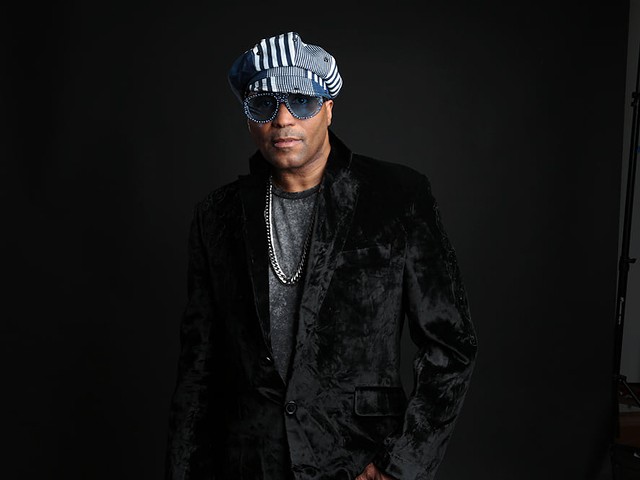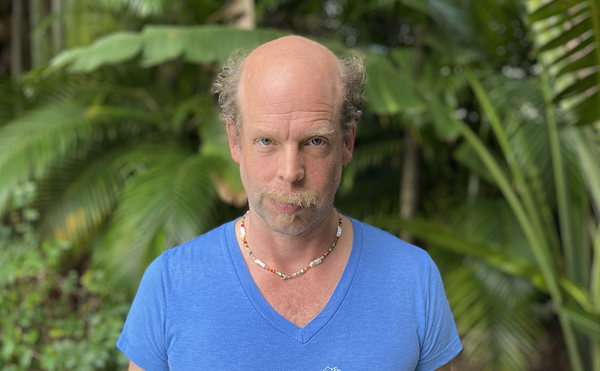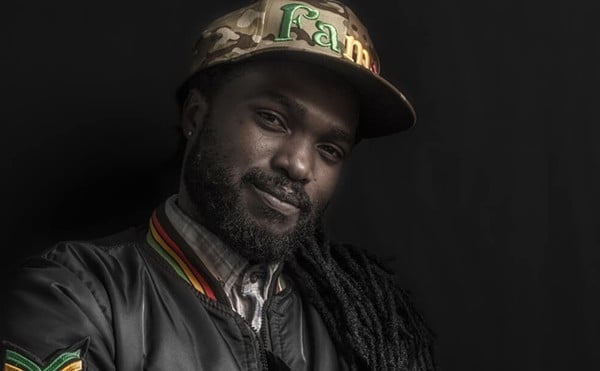It seems like just yesterday when kids were climbing into the rafters at local venues during those bonkers early White Reaper shows, but now, five albums and a decade into their career, the five-piece band are hard-touring veterans with a fairly deep and definitely eclectic discography.
From the breakneck garage punk of the early days to the thrash metal inspirations of their 2023 record, Asking For A Ride, Louisville’s White Reaper has incrementally shifted their sound to stay in front of redundancy.
Singer-guitarist Tony Esposito told LEO that the changes from record to record stem from the band not wanting to get bored — or, even worse, have stale live shows.
“I think we’re just trying to keep it interesting for ourselves, and, at least the way I look at it, add new things to our live set that maybe we don’t have, and searching for things in that way sort of leads us to new-ish grounds,” Esposito said.
Before White Reaper’s current U.S. tour hits home at Headliners Music Hall on Saturday, March 25, we thought it would be a good time to revisit the band’s first five (post-demo) albums to track how their sound has branched in different directions.
Below are short breakdowns of the albums, each featuring insight from a different member of the band.
White Reaper (2014)
White Reaper’s self-titled EP is the band at their most visceral — a no-frills, 16-minute rollercoaster ride full of youthful angst, stories about the painfully cool kids and fears about society’s never-ending quest to sink its teeth into the young and the creative. The songs aren’t overly complicated, but they’re also not vapid, mundane or stagnant. They take an idea and develop it into a quick, clever and ambiguous DIY ball of fury. The EP’s six songs have the raw attack of a demo, but with so much more polish — maybe White Reaper’s greatest gift is the ability to constantly craft catchy, melodic flourishes. From the addictive wave of fuzzy garage punk that defines the opening moments of “Cool” to the swirling synth in “Half Bad” to the ragged charm of “Conspirator,” there’s always a very subtle undercurrent of scrappy pop prowess that walks the line between aloof and inviting.
But, ultimately, the EP was an avenue to get music out as fast as possible, and maintain momentum, after they were signed to Polyvinyl Records. Recorded with two different local indie producers, and only two full-time band members — Esposito and drummer Nick Wilkerson — the project was a low-budget, patchwork affair, but that’s part of its lasting charm.
Wilkerson said the EP was, “definitely the foundation of the whole band.”
“It was definitely like a scrapbook of everything we had up until that point, which I feel like a lot of first EPs are the same way,” he continued.
White Reaper Does It Again (2015)
White Reaper’s sophomore release — and their first full-length album — showed the measured method of progression that the band would lean on for years to come: each new release takes a gradual step in a new direction, without sacrificing the core sound. As I’ve written in a few past reviews and breakdowns, a White Reaper song is always going to sound like a White Reaper song. The band just has a distinct style. So how did White Reaper’s second record contribute to that slowly rolling change? The explosive garage punk is still there, but the songs are bigger, more vibrant and more developed. They build, fall and twist more. The hooks and melodies are bright and burn into your brain, while the album’s 12 songs explore more territory, especially on the back half. The first three songs — “Make Me Wanna Die,” “I Don’t Think She Cares” and “Pills” — take the building blocks that they laid down in the first album and supercharge them, while tracks like “Friday the 13th” get a little more experimental and weird. White Reaper Does It Again feels like the second chapter to the first record, but it also showed the band wasn’t going to sink into redundancy and longevity was on the table.
It was also an album that added two new members: Nick’s twin brother Sam Wilkerson on bass and keyboardist Ryan Hater.
Hater said the magic of Does It Again was the experience.
“Nothing will ever compare to the feeling of working on the first full-length, and the excitement behind getting it out,” Hater said. “You kind of figure out what art direction you want to do and how you figure out sounds and stuff from there. You take that experience, and you’re just so raw, and then every other time is different because you’ve just grown off that first time.”
The World’s Best American Band (2017)
When White Reaper was recording The World’s Best American Band at La La Land Studios, I stopped in for an interview, and they played me the unfinished first minute of the album’s self-titled opening song. It was similar to the final product: the sound of an energetic live crowd, followed by steady drums and giant power chords that were given room to breathe. I remember thinking about how different it was, and how big of a risk it seemed like. But, that brief opening that I heard ended up setting the tone for a massive, ambitious (as made obvious by the album title) arena rock record that hits with flurries of riffs, a massive rhythm section, more involved keys and a sound that reached back to the gods of rock and roll. Thin Lizzy comps came rolling in, which weren’t exactly unwarranted, but also weren’t exactly a bullseye.
Esposito said the idea of The World’s Best American Band was to sonically move forward.
“The way I see it is the EP and Does It Again were the same ballpark so to speak, and that was kind of our germination period as a band, and I feel like we established that kind of sound and wanted to level up a little bit, so it was definitely a conscious goal of ours to add a little more detail and a little more technicality and kind of delete the formula that we had used prior.”
Lyrically, The World’s Best American Band is essentially a road album, and possibly incidentally about the benefits and cost of trying to become the greatest band in America — the songs are about being on the run, bouncing from place to place, going to cool parties along the way, but sometimes being stuck in the melancholy past, daydreaming about a person who was left behind.
Interestingly, White Reaper showed up to the studio with no lyrics ready, and struggled to write while there.
While scrambling to write, Esposito said he drew from “whatever immediate memories I had in terms of experiences of the last year,” as well as passages from random book scattered around the studio.
“It was a really intense time, but now I look back on it really fondly, but I don’t think I would ever go into a studio with nothing again,” he said, laughing.
You Deserve Love (2019)
If you’ve heard one White Reaper song, it’s likely “Might Be Right,” the Billboard Alternative Songs chart-topping lead single off of 2019’s You Deserve Love, the band’s first album on Elektra Records, a major label owned by Warner Music Group. With an instantly recognizable doom-infused keys opening, a force of a bass line, tight drumming, layers of guitars, splashes of synth, a heavy dose of White Reaper magnetism and lyrics that carry weight, “Might Be Right” deserves its popularity. And it’s not surprising that the track comes from the band’s slickest, most heavily-produced album.
Working with a big-name producer in Nashville’s Jay Joyce — and more time and money connected to the label upgrade — White Reaper aimed to make a thicker and more intricate album with You Deserve Love. It replaces the mullets-and-Marlboros-era lovable ruggedness of the previous album, and swaps it for early 21st Century college radio precision —strangely, the band can bring the same principals, grit and building blocks to both.
It’s also White Reaper’s first record featuring the latest member: guitarist Hunter Thompson, who helps with the added richness.
Bassist Sam Wilkerson said that You Deserve Love was about committing to a dense, complex record.
“With You Deserve Love, we wanted the ornamentation, we wanted to add extra stuff to brighten it and make it sparkle,” Wilkerson said. “We wanted to see what it was like to do the extra work and really hone in and see what parts are good enough where they stand and what parts could use extra layering and effects.”
Asking For A Ride (2023)
With a pandemic raging, the original four members of the band home in Louisville and the new guitarist back in Texas, White Reaper started the process of their latest album, Asking For A Ride, via an all-hands-on-deck road trip to an Arkansas Airbnb.
The noticeable twists on the 2023 album are the thrash metal influences, something that Thompson said dates back to that Arkansas trip.
“Tony was on a pretty big Metallica kick and we were watching all of the different documentaries at the Airbnb together at night, and one day Tony and I started playing around with some thrash-y riffs for fun and I don’t think we had any expectation that we were going to use it necessarily, but it was fun and it came out quickly and that ended up being the title track, the first track of the album,” Thompson said. “I think it was just a consequence of what we were listening to. We were in a little bit of a thrash phase at the beginning of the writing process.”
But, in an overarching sense, Asking For A Ride feels like the amalgamation of all of the previous records — there’s the unhinged garage punk of the first two records, there’s the massive moments of World’s Best, there’s the carefully calculated layers of You Deserve Love.
And it seems there was a major learning-curve counter-correction implemented via the new record: A few members have said that the majority of the songs from 2019’s You Deserve Love have been hard to incorporate into the live sets because of the studio intricacies, but Thompson said that so far the songs on Asking For A Ride have translated perfectly to the stage.
“Because they’re so high-energy, they’re hard for people not to just get down with them,” Thompson said. •







